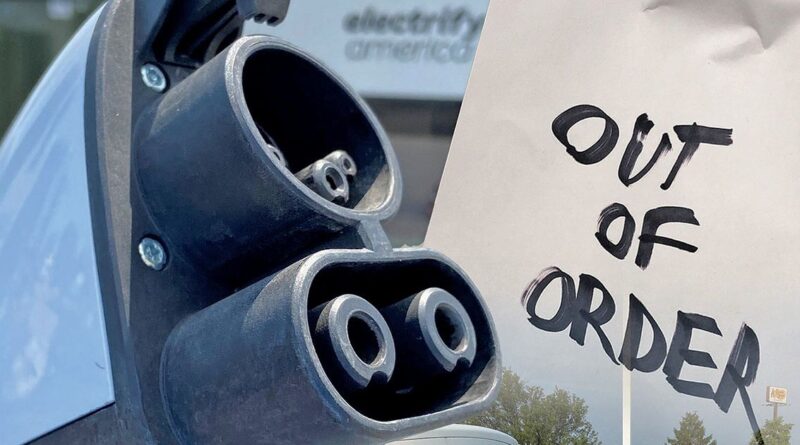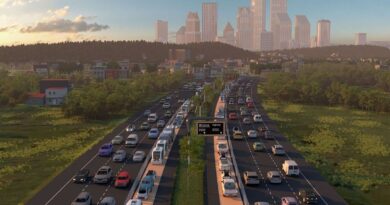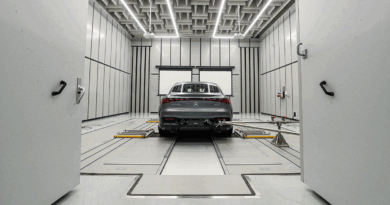Study: Public EV fast chargers less reliable than reported
Public electric vehicle charging infrastructure is not as reliable as many providers claim, according to a study in electric vehicle-heavy California.
A study of 657 connectors at 181 public direct-current fast charger stations in the San Francisco Bay area found about 23 percent of them to be “nonfunctioning.”
That finding, by researchers with the University of California, Berkeley, paints a different picture from the 95 to 98 percent uptime that charging station providers have claimed, David Rempel, a Berkeley professor and one of the study’s authors, told Automotive News.
“Chargers need to be working well, and functionality needs to be at a high level for there to be large-scale EV adoption,” Rempel said. “Do you really expect EV drivers to go to one charger, call the 1-800 number because it’s not working, and then spend 45 minutes going from one charger to the next — and be happy with that? No.”
The report comes as the federal government, aiming for rapid EV adoption over the course of the decade, prepares to distribute $5 billion over the next five years to build out the nation’s charging network.
The Joint Office of Energy and Transportation, established to distribute those funds to states, is expected to issue minimum standards and requirements for EV chargers in the coming days or weeks. States have until Aug. 1 to submit EV infrastructure plans to the office, which will begin approving plans by Sept. 30 and start to distribute funds, according to a government website.
“The next few months are really critical for the whole process of building a reliable EV infrastructure,” Rempel said. “The auto OEMs should be very aware of this process and ensure that reliability is high, and know that there is a system there to ensure that happens.”
It is not yet clear what standards the joint office, created by the U.S. Energy and Transportation departments following the passage of last year’s infrastructure bill, will adopt.
Rempel said any contracts that states enter into with charging providers should include “good, quality service agreements” that require chargers to be repaired rapidly.
“The money that’s handed out should be handed out in chunks, and the final piece shouldn’t be handed out to the service providers or owners of the system until it’s shown that all of the chargers work well,” he said.
The study, conducted between Feb. 12 and March 7, examined charging stations in and around San Francisco. The researchers deemed a charging point was functioning if it was able to charge for two minutes, or if a station was occupied by an EV that was being actively charged.
According to the researchers, 73 percent of DC fast charging points were considered functional, while 23 percent were deemed “not functional.” Almost 5 percent were considered to have a “station design failure” because the charging cable could not reach the vehicle’s charging port.
Common problems included failures with the station’s payment system, a failure to begin charging, error messages displayed on screen and blank or unresponsive screens, according to the researchers.
Rempel said Berkeley’s findings corroborate other recent surveys that showed reliability to be a concern for many DC fast charger users.
A February study by Plug In America reported that more than a third of users said broken chargers were at least a “moderate concern.”
A similar number of users said the distance between stations was an issue.
“Out of the box, we need to make sure EV infrastructure works well so it’s not something people point to and say, ‘I’ll wait to move to an EV until the system is better,’ ” Rempel said. “We need to get the infrastructure right from the start, and we shouldn’t be dumping a lot of money into infrastructure that leads to a poor system.”
Reliability concerns could be a major worry for established automakers looking to compete with Tesla, which has long dominated EV sales and has its own network of Superchargers, which are not accessible to other electric vehicles in the U.S. The Plug In America study showed that just 3 percent of Tesla users found broken chargers to be a serious concern.
Poor DC fast charger reliability will either lead people to not buy an EV or to opt for a Tesla, Rempel said.
“I believe in competition, and to have a competitive system, the whole thing needs to work well. Public chargers need to work well, in addition to the Tesla system,” he said.
But Tesla could soon open its Supercharger network to U.S. drivers of other vehicle brands, Tesla CEO Elon Musk said at a Financial Times event in May.
“We’ve already opened Tesla Superchargers to other electric cars in Europe, and we intend to roll that out worldwide,” he said.
The issue of working together on chargers has caught the eye of the Biden administration. In April, senior administration officials met with Musk, General Motors CEO Mary Barra, Ford Motor Co. CEO Jim Farley, Stellantis CEO Carlos Tavares and other top industry executives to discuss how the nation’s charging infrastructure should be developed.
According to a statement released afterward by the Department of Transportation, “There was broad consensus that charging stations and vehicles need to be interoperable and provide a seamless user experience, no matter what car you drive or where you charge your EV.”
Source : Autonews.com




